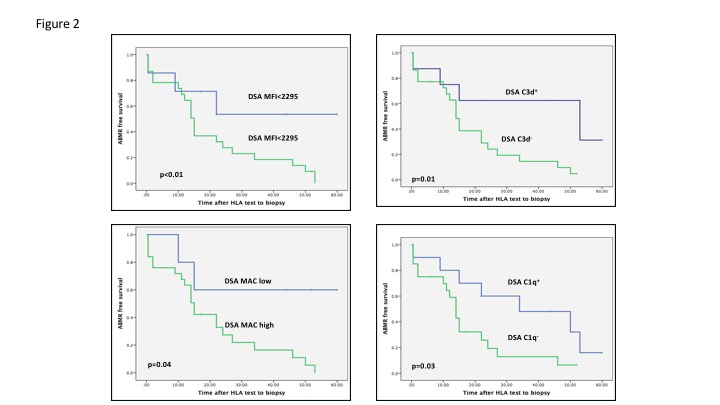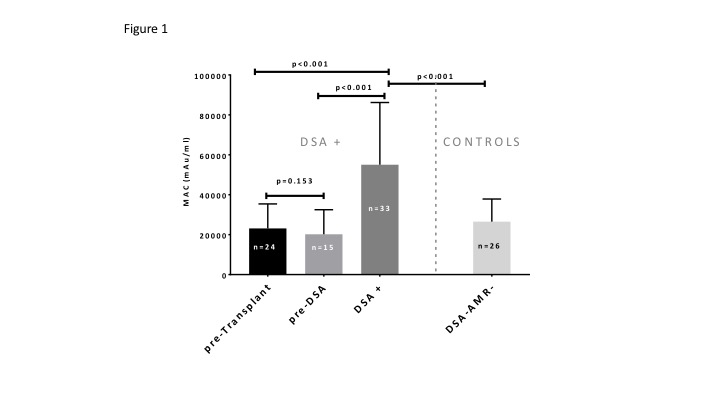Membrane Attack Complex as a More Sensitive Tool to Evaluate Complement Activation in Kidney Transplant Recipients with Donor-Specific Antibodies
Nephrology, Hospital del Mar, Barcelona, Spain
Meeting: 2022 American Transplant Congress
Abstract number: 1412
Keywords: Antibodies, Kidney, N/A, Outcome
Topic: Clinical Science » Kidney » 45 - Kidney Chronic Antibody Mediated Rejection
Session Information
Session Name: Kidney Chronic Antibody Mediated Rejection
Session Type: Poster Abstract
Date: Monday, June 6, 2022
Session Time: 7:00pm-8:00pm
 Presentation Time: 7:00pm-8:00pm
Presentation Time: 7:00pm-8:00pm
Location: Hynes Halls C & D
*Purpose: Kidney transplant recipients with late HLA donor-specific antibodies (DSA) detected with single antigen beads (SAB) exhibit more frequent antibody-mediated rejection (ABMR) and graft loss. Complement activation is one of the mechanisms involved in ABMR damage and has been assessed by the ability of SAB to bind C1q or C3d. The aim of our study was to evaluate the comparative prognostic information provided by MAC serum level in patients with late DSA class II.
*Methods: Of 425 kidney transplant patients (KT) monitored for HLA DSA 2008-2012 and prospectively followed, we selected those with HLA II DSA (DSA-II) and a contemporaneous control group of patients without DSA and a kidney biopsy without ABMR. We quantified serum levels of membrane attack complex (MACs) by ELISA in both groups before transplantation and at the moment of post-transplant SAB monitoring. Then, we analyzed the relationship between MAC and the ability of DSA-II to bind C1q/C3d as well as their MFI, and their possible prognostic impact.
*Results: 43 KT patients showed DSA-II and presented poor graft survival compared with DSA– patients. MAC levels at the moment of DSA were higher than in the same patients pre-transplant and post-transplantation before DSA (Figure 1). 32 DSA+ cases were C3d+ and 28 C1q+. In DSA+ patients, neither C3d+, nor C1q+, MFI over 2995 or MAC level were related with poor death-censored graft survival, but all of these were related to lower ABMR free survival (Figure 2). MAC level was the most sensitive assay and showed the best negative predictive value to discriminate ABMR (S=91% and VPN=66%) compared with C3d, C1q, and MFI>2995
*Conclusions: Late DSA class II are related with worse graft survival and a high rate of ABMR (55%). Their capacity to activate complement assessed by C3d binding assays or MACs level are related with ABMR diagnosis, been MACs level determination a more sensitive marker than C3d and C1q.
To cite this abstract in AMA style:
Arias-Cabrales C, Redondo-Pachón D, Rodríguez E, Riera M, Buxeda A, Pérez-Sáez M, Burballa C, Llinas L, Pascual J, Crespo M. Membrane Attack Complex as a More Sensitive Tool to Evaluate Complement Activation in Kidney Transplant Recipients with Donor-Specific Antibodies [abstract]. Am J Transplant. 2022; 22 (suppl 3). https://atcmeetingabstracts.com/abstract/membrane-attack-complex-as-a-more-sensitive-tool-to-evaluate-complement-activation-in-kidney-transplant-recipients-with-donor-specific-antibodies/. Accessed February 27, 2026.« Back to 2022 American Transplant Congress


